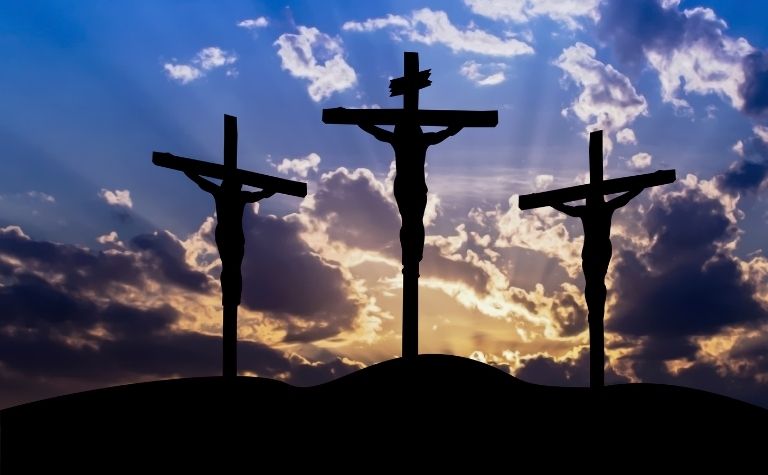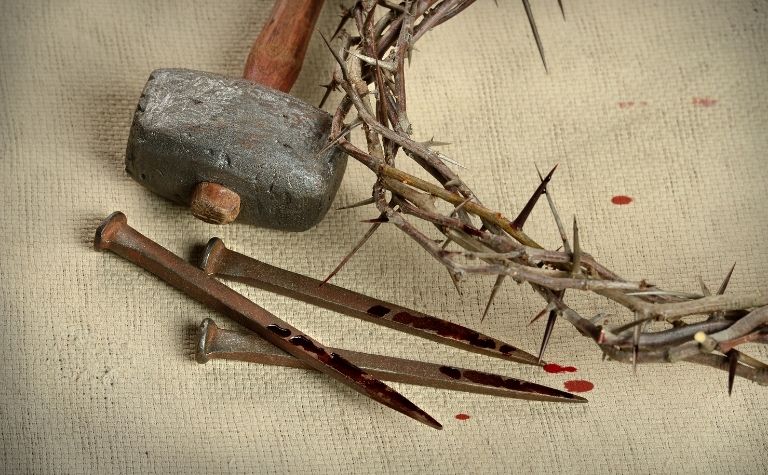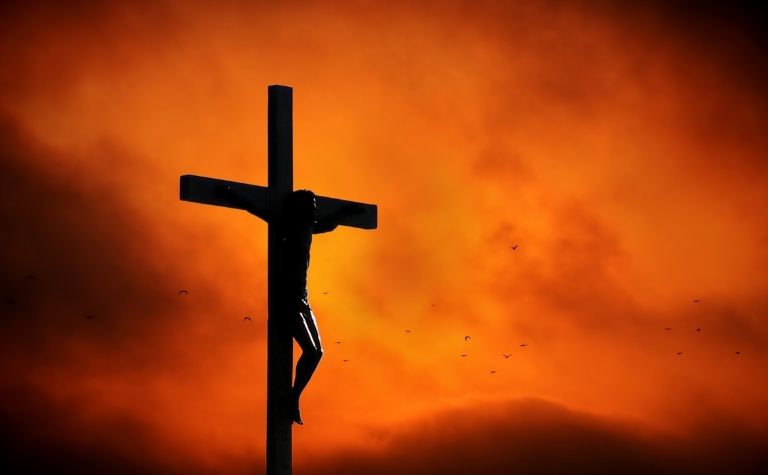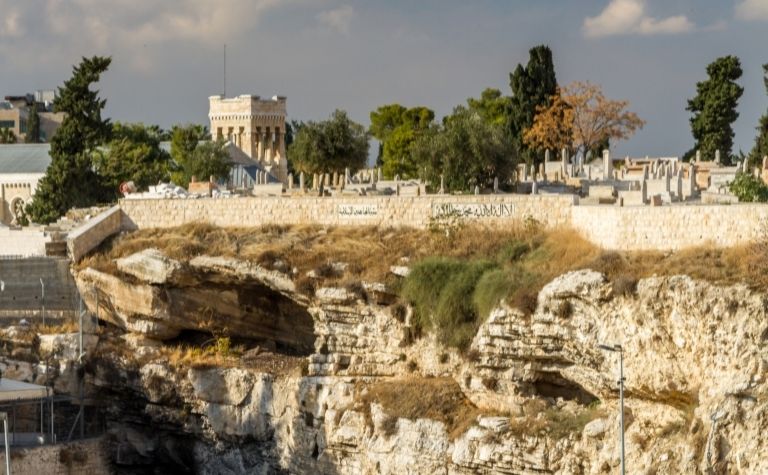The crucifixion of Jesus Christ is one of the most important events in the Bible. Jesus’ death on the cross, as well as his resurrection from the dead, are the climactic moments in the New Testament Gospels. Matthew, Mark, Luke, and John give readers numerous details about these events, including the exact place Jesus was crucified.
Jesus Christ was crucified at a place called “Golgotha” in Greek and “Calvary” in Latin. The location was also known as the “Place of the Skull.” Golgotha’s probable spot was just outside the northern wall of Jerusalem. However, a place called “Gordon’s Calvary” has been popular since the 1800s.
Why does Golgotha mean the “Place of the Skull”? Why do some English translations call the location “Calvary”? What is “Gordon’s Calvary,” and who is Gordon? Keep reading to learn the answers to these questions and others.
Also see Why Was Jesus Christ Crucified? to learn more.

Why is Golgotha called the Place of the Skull?
After Jesus was betrayed, arrested, tried, and beaten, he was marched to the place of his execution and forced to carry a cross on his back. He couldn’t carry the cross all the way to Golgotha because his body was so hurt and weak from the flogging he had just received.
Soldiers forced a man named Simon (not Simon Peter), who was nearby, to carry Jesus’ cross the rest of the way: “They compelled a passerby, Simon of Cyrene, who was coming in from the country, the father of Alexander and Rufus, to carry his cross” (Mark 15:21).
The Gospels reveal that their destination, the place of Jesus’ execution, was called Golgotha.
| Translation | Matthew 27:33 |
|---|---|
| ESV | And when they came to a place called Golgotha (which means Place of a Skull). |
| KJV | And when they were come unto a place called Golgotha, that is to say, a place of a skull. |
| NASB | And when they came to a place called Golgotha, which means Place of a Skull. |
| NIV | They came to a place called Golgotha (which means “the place of the skull”). |
| NLT | And they went out to a place called Golgotha (which means “Place of the Skull”). |
Matthew 27:33 and Mark 15:22 describe their arrival in the same way. They both provide the name, Golgotha, and its meaning, the “Place of the Skull.” While Golgotha’s exact location is a point of discussion today, the original readers of the Gospels knew exactly where it was.
What is the meaning of “Golgotha?” The word “Golgotha” is a Greek name, rendered into English without any change to its pronunciation. It has an Aramaic or Hebrew origin (cf. John 19:20). The name describes a hill or knoll just outside of Jerusalem and means “Place of the Skull.” Matthew, Mark, and John use the name “Golgotha” but Luke doesn’t.
Was Golgotha on a hill? None of the Gospel writers explicitly state that Golgotha was on a hill. However, the traditional interpretation of the name conveys the idea of a place that is elevated.
Since the Romans wanted other Jews to see Jesus’ crucifixion (many were in town for Passover), which is the reason for the sign placed on the cross that said “King of the Jews,” it makes sense that it was raised land, like ground atop a rock formation.
Why is Golgotha called the “Place of the Skull”? There are two common explanations for why Golgotha was called the “Place of the Skull” and it’s possible that both are true. First, the hill had the look of a skull when viewed from a distance and was named according to its appearance. Some believe the hill consisted of a unique rock formation that may have been natural or man-made.
Second, some believe that the name comes from the fact that the location contained a lot of skulls from crucified people. However, decapitation wasn’t typically part of the crucifixion process. Also, crucified bodies weren’t commonly left to rot to the point that only their skeletons remained.
However, it’s possible that there were some corpses of executed people on the hill and that “skull” is just a general description of that, so both options may be right.
Also see What Year Was Jesus Christ Crucified? to learn more.

Why is Golgotha called Calvary in the KJV and NKJV?
Luke’s Gospel doesn’t use the word “Golgotha” like Matthew and Mark do. Instead, it identifies the location by the meaning of the word Golgotha, i.e. “the place that is called The Skull.” Yet in some English translations, Luke 23:33 says “Calvary” instead “of Golgotha.”
What is the meaning of Calvary? The word “Calvary” only appears in the King James Version and New King James Version of the Bible. The word has a Latin origin. Yet Luke, like the other Gospel writers, wrote in Greek.
Luke uses the Greek word for “skull,” Kranion (which is where English gets the word “cranium”), just like Matthew and Mark. So why do the KJV and NKJV say “Calvary”?
| Translation | Luke 23:33 |
|---|---|
| ESV | And when they came to the place that is called The Skull, there they crucified him, and the criminals, one on his right and one on his left. |
| KJV | And when they were come to the place, which is called Calvary, there they crucified him, and the malefactors, one on the right hand, and the other on the left. |
| NKJV | And when they had come to the place called Calvary, there they crucified Him, and the criminals, one on the right hand and the other on the left. |
| NASB | When they came to the place called The Skull, there they crucified Him and the criminals, one on the right and the other on the left. |
| NIV | When they came to the place called the Skull, they crucified him there, along with the criminals—one on his right, the other on his left. |
| NLT | When they came to a place called The Skull, they nailed him to the cross. And the criminals were also crucified—one on his right and one on his left. |
Why do the KJV and NKJV call Golgotha “Calvary”? The NKJV calls the location “Calvary” because the KJV does. The KJV calls it Calvary, because the third-century Latin translation of the Bible, called the Vulgate, uses the word.
“Calvary” is how the Latin word Calvarium, meaning “skull,” is translated into English. Calvarium also appears in Matthew 27:33 and Mark 15:22, yet the KJV and NKJV render it “Golgotha.”
Also see What Time of Day Did Jesus Die? to learn more.
| Verse | Vulgate | KJV |
|---|---|---|
| Matthew 27:33 | Et venerunt in locum qui dicitur Golgotha, quod est Calvariæ locus. | And when they were come unto a place called Golgotha, that is to say, a place of a skull, |
| Mark 15:22 | Et perducunt illum in Golgotha locum: quod est interpretatum Calvariæ locus. | And they bring him unto the place Golgotha, which is, being interpreted, The place of a skull. |
| Luke 23:33 | Et postquam venerunt in locum qui vocatur Calvariæ, ibi crucifixerunt eum: et latrones, unum a dextris, et alterum a sinistris. | And when they were come to the place, which is called Calvary, there they crucified him, and the malefactors, one on the right hand, and the other on the left. |
| John 19:17 | Et bajulans sibi crucem exivit in eum, qui dicitur Calvariæ locum, hebraice autem Golgotha: | And he bearing his cross went forth into a place called the place of a skull, which is called in the Hebrew Golgotha |
Why don’t the KJV and NKJV translate the name “Calvary” outside of Luke? The KJV and NKJV only use “Calvary” in Luke’s Gospel because he is the only writer that doesn’t use the Greek word “Golgotha.” He merely says the “place called Skull.”
The Vulgate may be supplying the exact place name to identify its exact location for readers and in order to be in harmony with the other three Gospels. Whatever the Vulgate’s reason, the KJV and NKJV version follow its lead.
Why doesn’t the NKJV update its translation? Tradition. “Calvary” isn’t an incorrect translation; it just renders “Golgotha” in a different language. The Church also has centuries of teaching and music that use the word Calvary because Latin was its dominant language for a millennium.
“Calvary” is also commonly known, which means it doesn’t create confusion for most readers. Many Christians today may not know the history of the word, but they know its basic meaning thanks to well-known hymns like “At Calvary.”
Also see What Day of the Week Did Jesus Die? to learn more.

John also identifies the location of Jesus’ crucifixion
After Pilate handed Jesus over to be crucified, the authorities took him to Golgotha. John identifies the location the same way Matthew and Mark do, with the name “Golgotha.”
| Translation | John 19:17 |
|---|---|
| ESV | and he went out, bearing his own cross, to the place called The Place of a Skull, which in Aramaic is called Golgotha. |
| KJV | And he bearing his cross went forth into a place called the place of a skull, which is called in the Hebrew Golgotha: |
| NASB | They took Jesus, therefore, and He went out, bearing His own cross, to the place called the Place of a Skull, which is called in Hebrew, Golgotha. |
| NIV | Carrying his own cross, he went out to the place of the Skull (which in Aramaic is called Golgotha). |
| NLT | Carrying the cross by himself, he went to the place called Place of the Skull (in Hebrew, Golgotha ). |
John says that Golgotha was near the city, which is consistent with a location just outside the northern wall. “Many of the Jews read this inscription, for the place where Jesus was crucified was near the city, and it was written in Aramaic, in Latin, and in Greek.” (John 19:20)
Also see Who Murdered Jesus Christ? to learn more.
What is Gordon’s Calvary?
Charles George Gordon (1833-1885) was a British soldier who became convinced that the location of Golgotha is near the Church of the Holy Sepulchre and not just outside the northern wall.
Gordon was not the first to suggest the location, but he became known for supporting the view. In fact, he was so adamant that some people began calling the site “Gordon’s Calvary.”

Also see How Old Was Jesus When He Was Crucified? to learn more.
Related Questions
Jesus of Nazareth is one of the most influential people in world history. Though he was born into a poor family, worked an uncelebrated job as a carpenter, and died in his early 30s, he arguably...
The crucifixion of Jesus of Nazareth is one of the most pivotal moments in world history. The death of a poor Jewish carpenter during the days of the Roman Empire wouldn't ordinarily have garnered...
